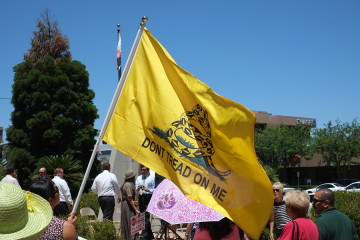Trump’s Wiretapping Claims Should Be Taken Seriously: Eli Lake

published Mar 15th 2017, 4:18 pm, by Eli Lake
(Bloomberg View) —
The current scandal surrounding President Donald Trump’s tweeted accusations that his predecessor wiretapped Trump Tower is proof of what might be called the Salena Zito rule. Zito, of course, wrote the essay in the Atlantic how Trump’s supporters took him “seriously, but not literally,” whereas the press took him “literally, but not seriously.”
This is a good way to understand the current state of the investigation of Russian meddling in the 2016 election and Trump’s wild accusations against Barack Obama. Barring an unexpected turn of events, FBI director James Comey will confirm on Monday before the House Intelligence Committee that what Trump tweeted on March 4 was literally false. There was no authorized surveillance of Trump Tower.
Nonetheless, there may be reason to take the gist of Trump’s tweet seriously. At least this is the upshot of the latest turn in the story. On Wednesday Representative Devin Nunes, the Republican chairman of the House intelligence panel, and that body’s ranking Democrat, Adam Schiff announced they were seeking information on how the identities of American citizens picked up in eavesdropping on foreign targets were unmasked in more widely disseminated intelligence reports.
This is important because of the case of Michael Flynn, Trump’s first national security adviser. He resigned after the Washington Post reported on his conversations with the Russian ambassador to the U.S., Sergei Kislyak, that took place after Trump’s victory but before his swearing in. At the time, the story was about how Flynn had not come clean about an element of those conversations, touching on sanctions just imposed on Russia.
But another big part of that story is how the intercepted communications of an incoming national security adviser found its way into the newspaper. Earlier this month, Obama’s last director of national intelligence, James Clapper, said there were no Foreign Intelligence Surveillance Act warrants that he knew about targeting Trump or his campaign. This surely means that Flynn was caught on a wiretap of the Russian ambassador. Normally, the names of Americans “incidentally collected,” to use the intelligence community’s phrase, are redacted from reports that are sent out to senior government officials. Was Flynn’s name redacted in this case? If not, were summaries or transcripts of his conversation widely distributed within the government? Which would have made it easier to leak.
That’s what Nunes and Schiff want to know. In a March 15 letter to the heads of the CIA, FBI and National Security Agency, they asked for the total number of times a U.S. person’s identity was unmasked between June 2016 and January 2017. They also want to know the names of any U.S. persons unmasked in incidental collection who were affiliated or part of the Trump or Hillary Clinton campaigns in this same period, and who inside the executive branch asked for these names to be unmasked.
In Flynn’s case, there may be sound reasons for why his name was not redacted from intelligence reports. Adam Klein, a senior fellow at the Center for a New American Security, told me Wednesday that it’s plausible to find a foreign intelligence justification for unmasking the identity of someone like Flynn. “That in and of itself is not necessarily improper,” he said. “But we should remember what is relevant for foreign intelligence purposes is in the eye of the beholder. Something that might seem innocent on its face, might appear more nefarious from the perspective of someone who views the incoming team’s policies with skepticism.”
There is already some evidence to suggest Nunes and Schiff are onto something. On March 1, the New York Times reported that in the final days and weeks of the Obama administration, White House officials rushed to preserve and distribute intelligence on connections between Russia and Trump’s associates throughout the government. In practice this meant that raw intelligence was processed into analytical reports and classified at a relatively low level. “As Inauguration Day approached, Obama White House officials grew convinced that the intelligence was damning and that they needed to ensure that as many people as possible inside government could see it,” according to the Times.
Did this raw intelligence include Flynn’s calls with the Russian ambassador? Depending on what Schiff and Nunes turn up, this could be a real scandal, particularly if the names of other Trump associates picked up in incidental surveillance were unmasked and distributed widely within the government.
This would mean that the Obama administration had effectively short-circuited the FISA process by checking to see if Trump associates were picked up incidentally on existing surveillance, and then disseminating the take widely within the intelligence bureaucracy. That’s not the same as ordering — without court oversight — a targeted wiretap on Trump Tower. But it’s pretty serious, nonetheless.
This column does not necessarily reflect the opinion of the editorial board or Bloomberg LP and its owners.
Eli Lake is a Bloomberg View columnist. He was the senior national security correspondent for the Daily Beast and covered national security and intelligence for the Washington Times, the New York Sun and UPI.
To contact the author of this story: Eli Lake at elake1@bloomberg.net To contact the editor responsible for this story: Tobin Harshaw at tharshaw@bloomberg.net
For more columns from Bloomberg View, visit Bloomberg view
COPYRIGHT © 2017 Bloomberg L.P







No Comment